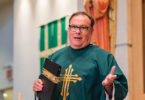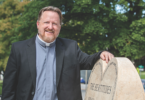
by Michael Podrebarac
The church in the United States is preparing to embark on a journey toward what our bishops are calling a “revival” of eucharistic amazement and coherence. This endeavor will be front and center for the next three years and, God willing, for the rest of our lives.
Where has all of this come from? It appears that, as a group, we Catholics have misplaced our appreciation of the presence of Jesus in the Eucharist.
Recent surveys suggest that there’s a gap in most American Catholics’ understanding of Jesus being present “really and substantially” in the Blessed Sacrament, and that some no longer believe it at all.
Of course, our belief in the Eucharist — in all of its dimensions — is foundational to our lives as Catholics. The church defines the Eucharist as the “summit” of the church’s experience on earth, as well as the “font” from which flows all the power necessary for us to do God’s will therein. Without the Eucharist, we simply cannot live as Catholic Christians, and this has always been true.
Of course, the best way of growing in our eucharistic amazement and coherence is to attend Mass mindfully and prayerfully.
The words, gestures and actions of the Mass draw us into the heart of the Eucharist: God’s sacrificial love for us.
Our response to this love is to nurture in our hearts and minds a sacrificial love for God and for our neighbors.
It’s not rocket science, even if it possesses many layers of beautiful thought and understanding. God is love. Love is meant to be shared. God has shared it with us through Jesus Christ. We then share it back with God and with everyone else whom God also loves, which excludes no one.
Speaking of beautiful thought, perhaps St. Thomas Aquinas expressed it best in one of the liturgical texts he penned for the solemnity of the Body and Blood of Christ. It sums up Mass quite neatly and provides us a primer upon which to return when we find our faith misplaced or obscured:
“O sacred banquet, in which Christ is received, the memory of his Passion is renewed, the mind is filled with grace, and the pledge of future glory is given to us.”
The Mass renews on the altar the Passion of Our Lord Jesus Christ through his body and blood offered to the Father. We then feed upon Christ himself in this sacred banquet.
The redemptive grace we receive through the Holy Spirit commits us to greater virtue and love.
Through receiving holy Communion, we literally foretaste the joys of heaven.
It’s really that simple, and yet that profound. At any rate, it’s not that hard to remember, and just makes sense.






